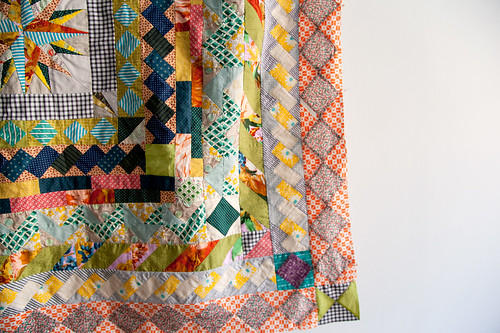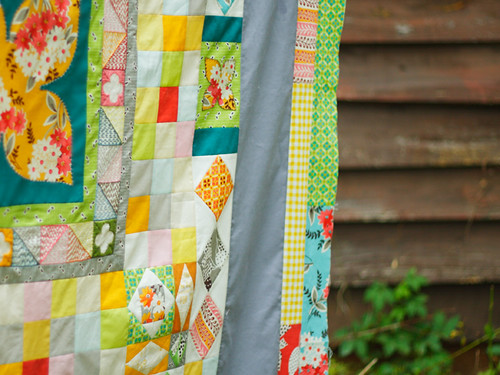on Being Original
When you make something, is it important to you that it be a creative act? In today's sense I mean, do you hope it is unique, original,
creative?
In a way nearly every quilt or potholder or handmade baby dress is one-of-a-kind. Usually even when following a pattern, you choose your own fabrics and often take a few liberties with the pattern itself. I value pattern-following, especially when I'm learning new techniques. But, there's something really different that happens when you start from scratch. When an idea kind of hits you and you sketch out that quilt or let your scraps lead you in an improvisational dance. It's charming. It's delightful. It feels really good.

But is it "scratch" really, that you started with? None of us are blank slates. Particularly in today's connected interwebs, our eyes have feasted on images too countless to mentally catalog. If I create something, I may not even remember that I've seen something quite similar before. And even if I do remember seeing something similar, since mine is different, where is the line between imitating and creating?
On the subject of being original, I've wanted to share a quote with you for awhile. Jacques-Louis David, a French painter circa 1700's said, "In the arts the way in which an idea is rendered, and the manner in which it is expressed, is much more important than the idea itself." I think that old ideas rendered uniquely are really the only kind of "new" ideas that exist.
Being original is taking those ideas you've gathered and transforming them into something meaningful and unique to you. I've been marinating on this and today read a line in Twyla Tharp's The Creative Habit that struck a chord:
that struck a chord:
"The tricky part... is that you can't stop with one idea. Henry James said that genius is the act of perceiving similarity among disparate things. In the empty room you're trying to connect the dots, linking A to B to C maybe to come up with H....You cannot stop with one idea. You don't really have a workable idea until you combine two ideas (pg 103)."
Twyla's words got me thinking of the Modern Medallion quilt. I can recall the development of that big idea, which began with this quilt by Carrie Strine.

Her quilt, in turn, was inspired by this quilt-along. And the quilt-along? Based on a heritage of traditional medallion quilts. At first I wanted to make a quilt just like Carrie's, but in time I realized I'd be happier to make it my own. A river of inspiration..
...merged and tumbled and truly transformed itself into a new quilt that I do claim my own.
Yes, I do claim it as my own, but I also recognize that I do not create in a vacuum. I don't ever plan to either. I enjoy recognizing threads of the fiber arts community sewn into my work. And, in turn, I'll enjoy seeing my influences emerge in yours.
And if I am so fortunate as to see one of my little ideas transformed and combined with other ideas into something fabulous that you make all your own, and if in that moment of recognition I also find myself totally enamored with your creation, I should humbly acknowledge that the idea I donated is not nearly as important as "the way in which an idea is rendered, and the manner in which it is expressed."
In other words, we should all own our originals.
In a way nearly every quilt or potholder or handmade baby dress is one-of-a-kind. Usually even when following a pattern, you choose your own fabrics and often take a few liberties with the pattern itself. I value pattern-following, especially when I'm learning new techniques. But, there's something really different that happens when you start from scratch. When an idea kind of hits you and you sketch out that quilt or let your scraps lead you in an improvisational dance. It's charming. It's delightful. It feels really good.

But is it "scratch" really, that you started with? None of us are blank slates. Particularly in today's connected interwebs, our eyes have feasted on images too countless to mentally catalog. If I create something, I may not even remember that I've seen something quite similar before. And even if I do remember seeing something similar, since mine is different, where is the line between imitating and creating?
On the subject of being original, I've wanted to share a quote with you for awhile. Jacques-Louis David, a French painter circa 1700's said, "In the arts the way in which an idea is rendered, and the manner in which it is expressed, is much more important than the idea itself." I think that old ideas rendered uniquely are really the only kind of "new" ideas that exist.
Being original is taking those ideas you've gathered and transforming them into something meaningful and unique to you. I've been marinating on this and today read a line in Twyla Tharp's The Creative Habit
"The tricky part... is that you can't stop with one idea. Henry James said that genius is the act of perceiving similarity among disparate things. In the empty room you're trying to connect the dots, linking A to B to C maybe to come up with H....You cannot stop with one idea. You don't really have a workable idea until you combine two ideas (pg 103)."
Twyla's words got me thinking of the Modern Medallion quilt. I can recall the development of that big idea, which began with this quilt by Carrie Strine.

Her quilt, in turn, was inspired by this quilt-along. And the quilt-along? Based on a heritage of traditional medallion quilts. At first I wanted to make a quilt just like Carrie's, but in time I realized I'd be happier to make it my own. A river of inspiration..
 |
| by Zakka Inspired |
 |
| by Georgia Gray |
 |
| by Sometimes Crafter |
 |
| by the Small Forest |
...merged and tumbled and truly transformed itself into a new quilt that I do claim my own.
Yes, I do claim it as my own, but I also recognize that I do not create in a vacuum. I don't ever plan to either. I enjoy recognizing threads of the fiber arts community sewn into my work. And, in turn, I'll enjoy seeing my influences emerge in yours.
And if I am so fortunate as to see one of my little ideas transformed and combined with other ideas into something fabulous that you make all your own, and if in that moment of recognition I also find myself totally enamored with your creation, I should humbly acknowledge that the idea I donated is not nearly as important as "the way in which an idea is rendered, and the manner in which it is expressed."
In other words, we should all own our originals.

